Duties of Chief Officer in Merchant Navy
The chief officer is the 2nd in command after the Captain/Master onboard a Merchant vessel. The Chief officer also known as Chief Mate or First Mate is the head of the deck department and supervises the entire deck crew. The job of a Chief officer onboard the ship is really hectic and stressful. In the following blog, we will discuss in detail the duties of the chief officer in merchant navy.
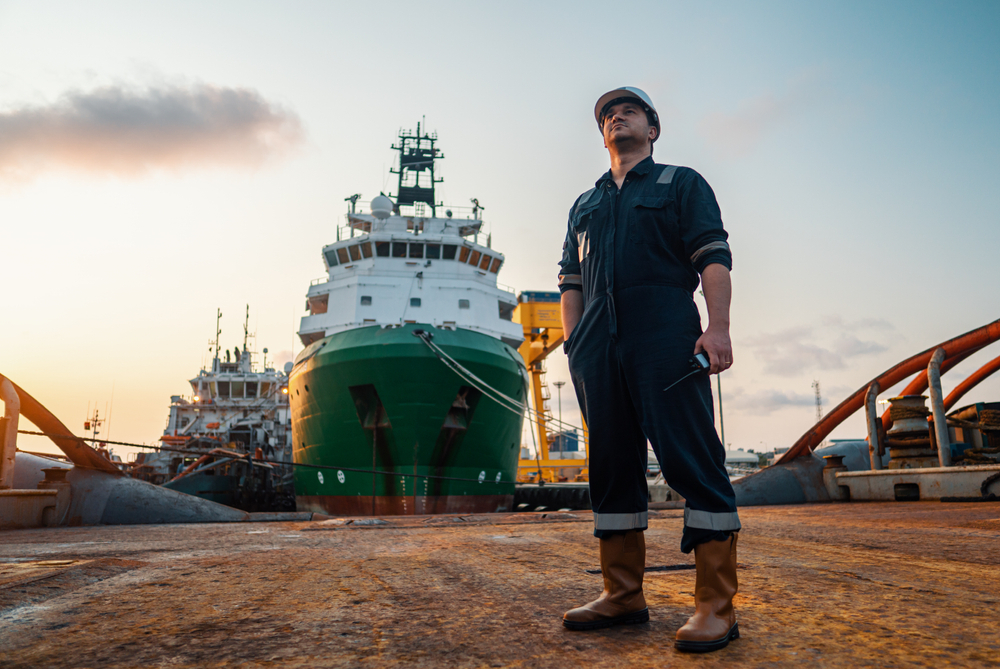
General Duties of Chief Officer in Merchant Navy
The Chief officer is the Master/Captain’s deputy or second in command. The Chief officer should understudy all aspects of the Master/Captain’s responsibilities. The Chief officer must keep the Master/Captain fully informed about any concerns regarding his/her responsibilities. In case of incapacity or death of a Master/Captain, the Chief officer has to take over the command of the vessel until suitably relieved.
Navigation Duties of Chief Officer in Merchant Navy
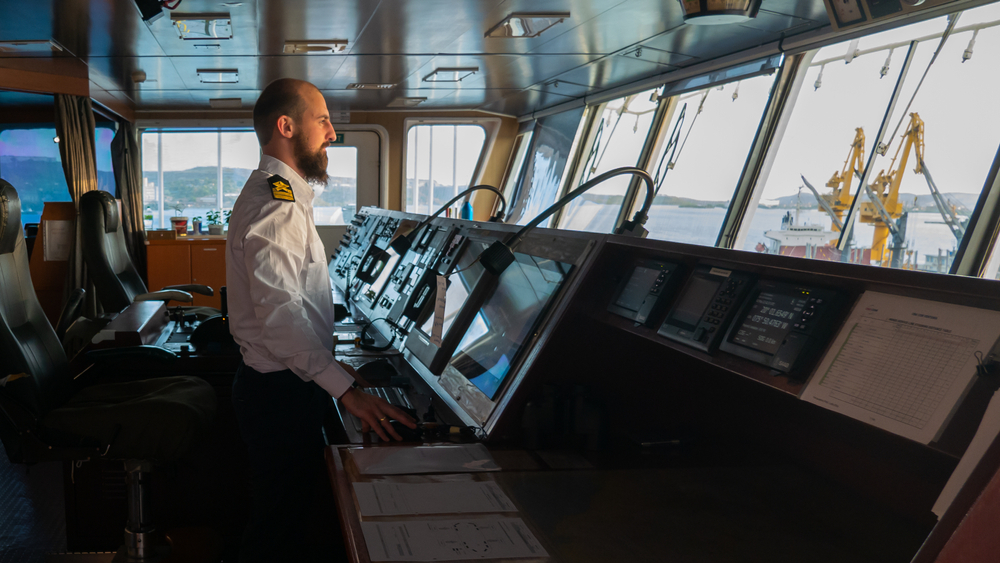
The Chief officer has to keep a navigational watch as instructed by the Master, generally, in most vessels, the Chief officer along with the Deck cadet maintains a watch from 0400 – 0800 hrs and 1600 – 2000 hrs. They also need to assist in carrying out the pre-arrival and pre-departure navigation tests. On vessels where the Chief officer is a day worker with an additional deck officer, the Chief officer must keep navigational watches for a period of not less than 8 hours/week to maintain the navigational skills.
Ballast and Cargo Operation Duties of Chief Officer in Merchant Navy
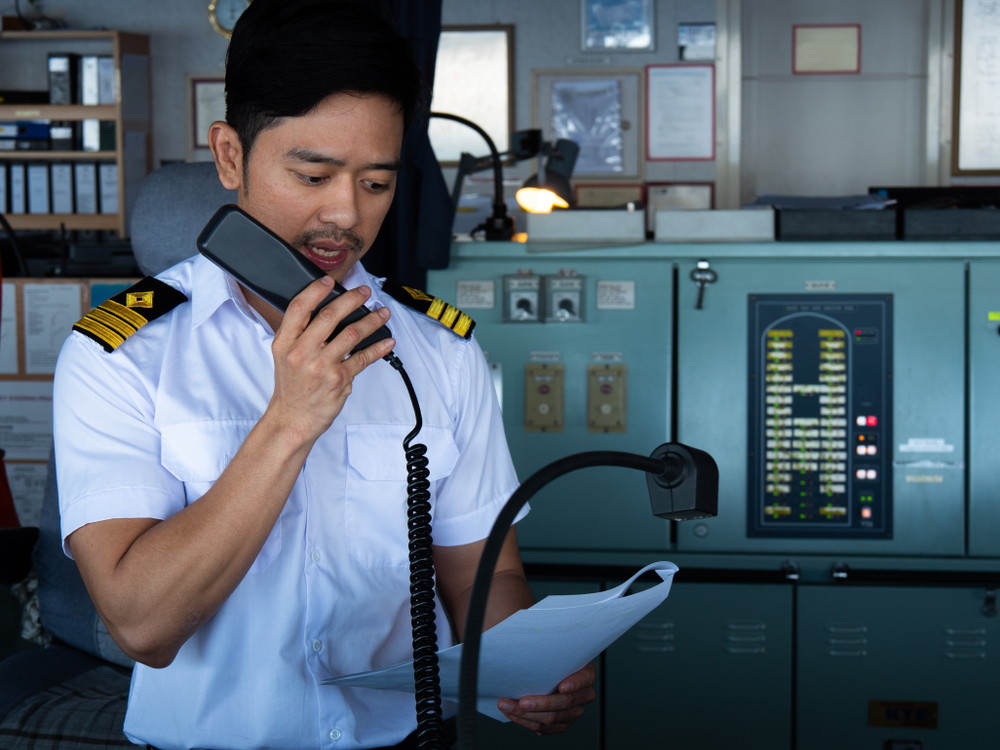
The Chief officer is the designated cargo and ballast water management officer and is responsible for –
- The vessel’s cargo worthiness and pre-loading preparations.
- Safe cargo loading, stowing, and securing.
- Ensuring that stresses and stability of the vessel are always within limits.
- Care of cargo during passage with respect to monitoring, ventilation, cooling, heating, etc. as required by terms of carriage.
- Safe discharge of cargo.
- Maintaining records of cargo parameters, soundings of ballast tanks, and other spaces.
- Informing the Chief engineer regarding distribution and consumption of fresh water and bunkers for stability requirements.
- Ensuring that ballasting and de-ballasting operations are conducted as per the approved ballast water management plan.
- Optimum ballast distribution at all times keeping the stresses and stability within limits to achieve maximum cargo uptake and fuel efficiency.
- Maintaining records of ballast operations.
- Issuing instructions to vessel staff for performing cargo operations.
- Ensuring cargo-related checklists and work instructions are complied with.
Safety And Security Duties of Chief Officer in Merchant Navy
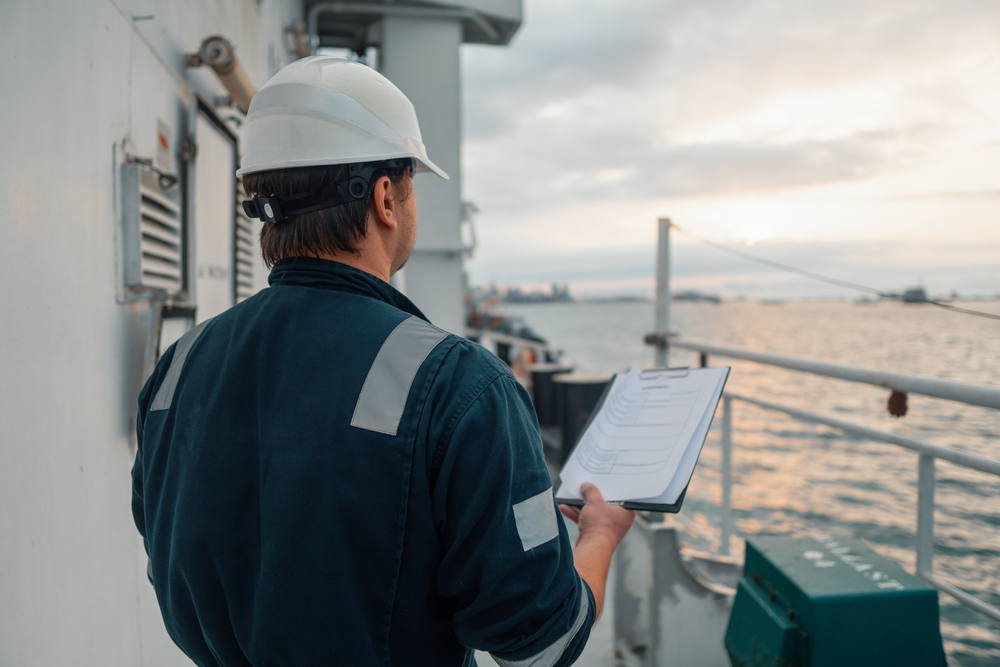
- The Chief officer is responsible for carrying out the duties of a Safety officer (when appointed by the Master as per schedule).
- They are responsible for carrying out preparations on deck for arrival into a port or congested waters.
- Chief officers assist in mooring/unmooring operations, securing decks for proceeding to sea, and allowing for the possibility of heavy weather.
- They need to ensure that all openings, which could permit ingress of water into the hull, are effectively closed.
- Chief officers have to carry out the duties of the Ship Security Officer as per the Ship Security Plan.
- They need to ensure that the vessel’s staff carries out stowaway and drug searches.
Environmental Protection Duties of Chief Officer in Merchant Navy
- The chief officer is responsible for maintaining oil spill response equipment.
- They have to manage garbage as per the ‘Garbage Management Plan’.
- The chief officer has to maintain the ‘Garbage Record Book’.
- Chief officers have to act as oil spill coordinators on Oil tankers.
- The chief officer has to maintain the Oil Record Book on Oil tankers.
- The chief officer has to assist the Master and Chief Engineer in achieving the objectives and targets assigned to the vessel on environmental aspects (on vessels certified to ISO 14001 standard.)
Maintenance Duties of Chief Officer in Merchant Navy
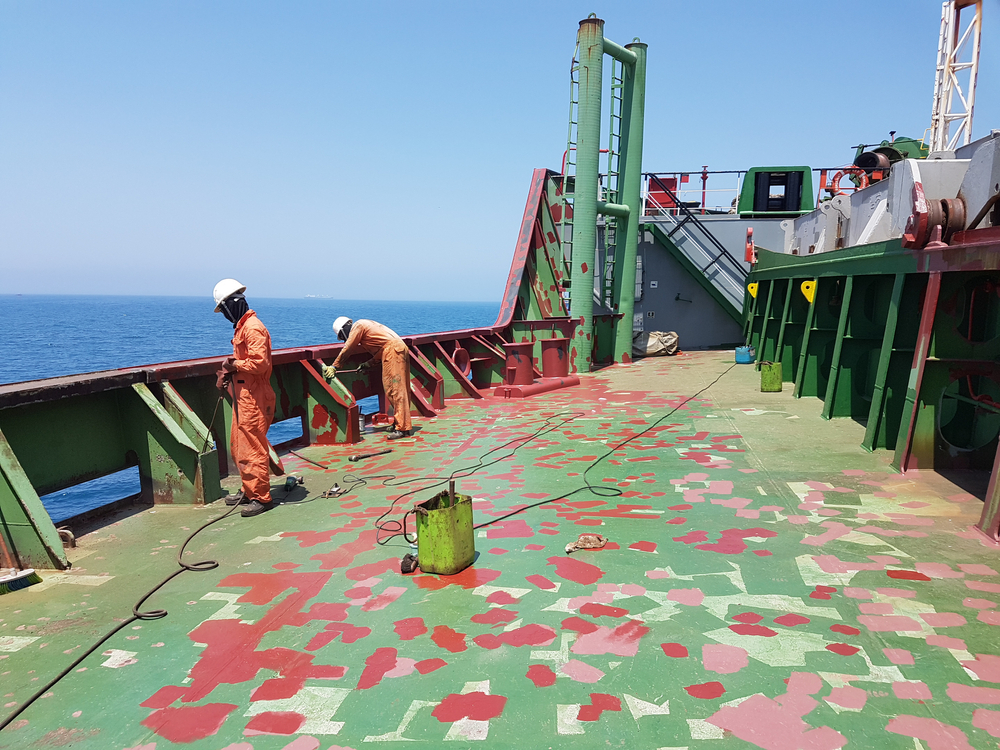
- The chief officer ensures compliance with the deck planned maintenance program and keeping records.
- The chief officer also looks after the maintenance of life-saving and fire-fighting appliances on deck and guides the designated officer.
- They need to identify and maintain critical equipements on deck.
- The chief officer is also responsible for the maintenance of the hull, decks, accommodation, and tanks/void spaces.
- They need to regularly monitor the hull for fouling and immediately inform the office in case of excessive fouling.
- They need to regularly monitor the condition, operation, maintenance, and availability of deck and cargo equipment.
- They have to look after the upkeep and maintenance of all deck stores.
- They also need to ensure that the work safety equipment on deck is being maintained.
Personnel Management
Chief officer is the head of the deck and catering departments and is responsible for –
- Ensuring compliance with safety and environmental protection procedures by deck and shore personnel.
- Ensuring junior officers maintain port watches under their supervision.
- Allocating daily work to the deck and catering crew.
- Preparing appraisal reports for deck and catering crew.
- Advising Master on the performance of Deck officers, routinely as well as for appraisal reports.
Training And Drills
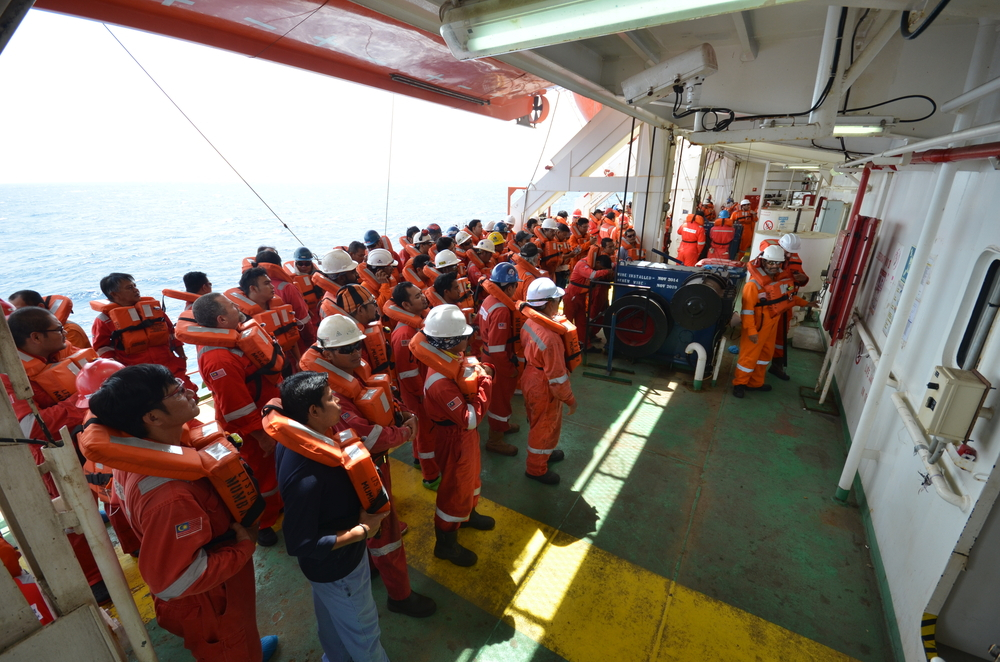
- The Chief officer is responsible for the training of Deck Cadets and trainees in deck and catering departments.
- They are responsible for the planning and execution of safety training and emergency drill schedules.
- The Chief officer has to look after the safety familiarization of new joiners, including supernumeraries, and guide the designated officer.
- They are responsible for the job familiarization of deck and catering staff.
- The Chief officer is responsible for the cargo familiarization of deck officers.
- They have to supervise junior officers’ use of planned maintenance programs.
- They are also responsible for training vessel staff on garbage management.
Administration and Recordkeeping
- Chief officers have to look after the upkeep of the Deck Logbook, reports concerning cargo and deck maintenance, and deck-related company reports.
- They have to maintain inventory and consumption records of deck stores, spares, and paints.
- They need to prepare requisitions for deck stores, spares, and paints.
- Chief officers have to scrutinize requisitions from other deck officers prior submitting them to the Master.
- They need to receive and sign for deck stores, spares, and paints, ensuring that the quality and quantity of the items confirm to the order.
Key Goals of Chief Officer in Merchant Navy
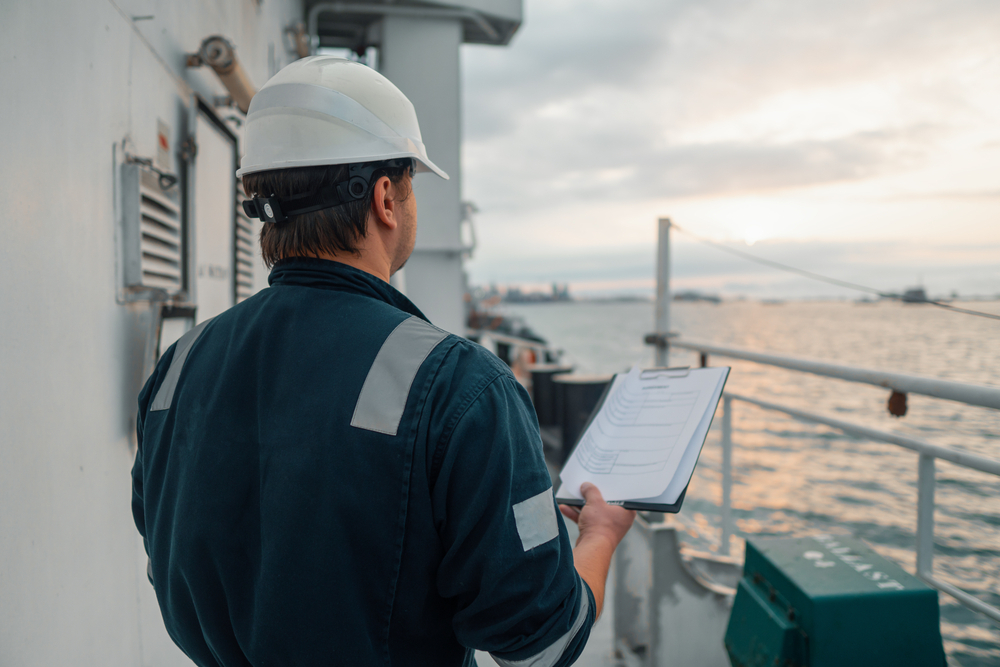
- No commercial losses or delays or off-hires.
- No expired or overdue for service life-saving and firefighting appliances.
- No overdue maintenance/testing of critical equipment in own areas of responsibility.
- No damage or loss of cargo.
- No official complaint from third parties (cargo interests/ports etc.)
- No major breach of security.
- No inter-departmental conflict.
- No spares to be below minimum and critical spares requirement in own areas of responsibility.
Disclaimer :- The opinions expressed in this article belong solely to the author and may not necessarily reflect those of Merchant Navy Decoded. We cannot guarantee the accuracy of the information provided and disclaim any responsibility for it. Data and visuals used are sourced from publicly available information and may not be authenticated by any regulatory body. Reviews and comments appearing on our blogs represent the opinions of individuals and do not necessarily reflect the views of Merchant Navy Decoded. We are not responsible for any loss or damage resulting from reliance on these reviews or comments.
Reproduction, copying, sharing, or use of the article or images in any form is strictly prohibited without prior permission from both the author and Merchant Navy Decoded.

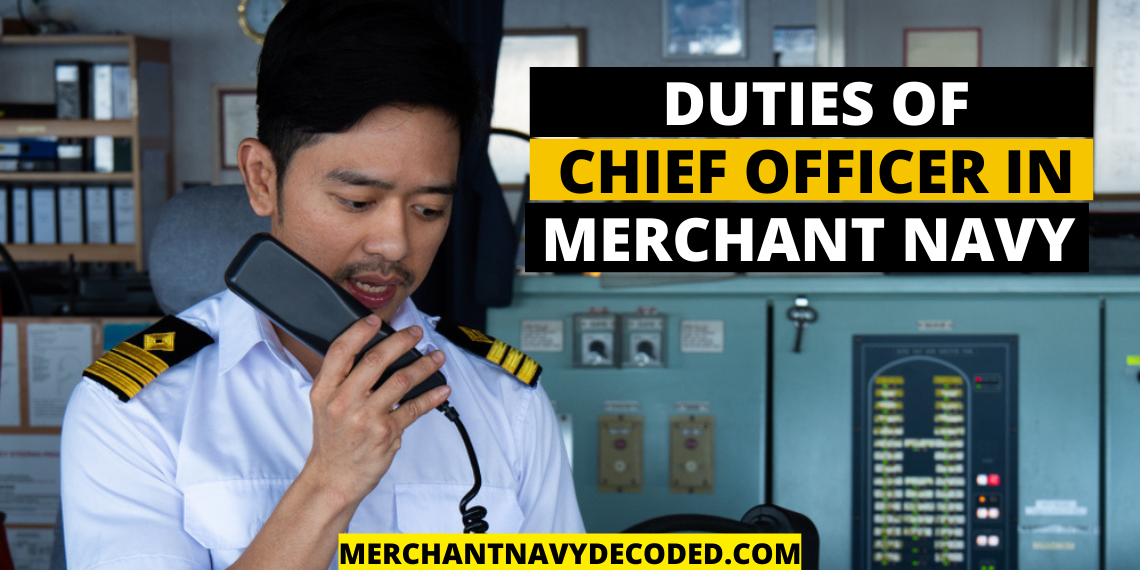


ok sir
… [Trackback]
[…] Read More here: merchantnavydecoded.com/duties-of-chief-officer-in-merchant-navy/ […]